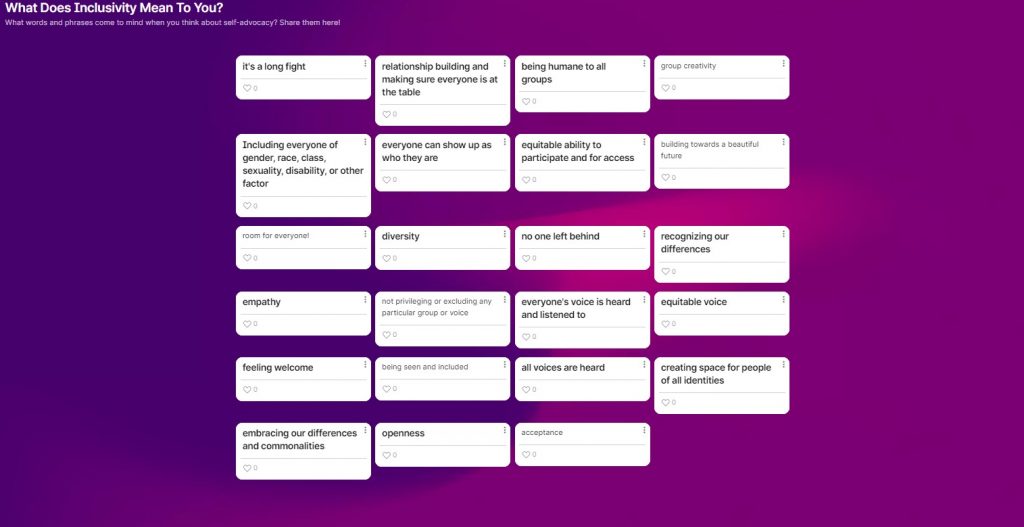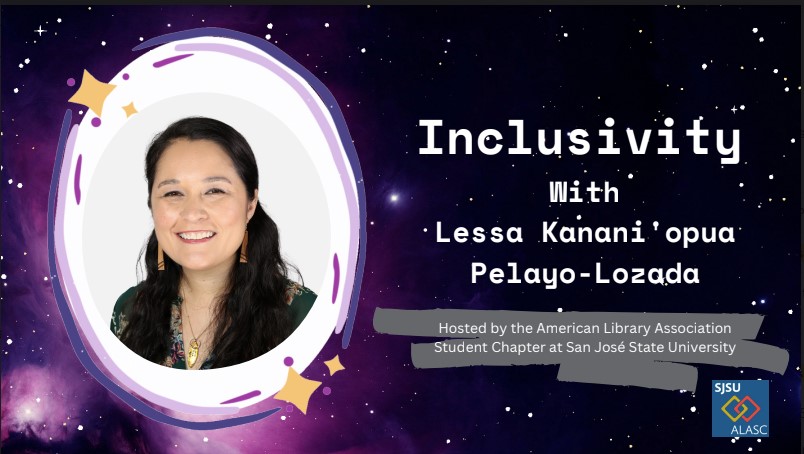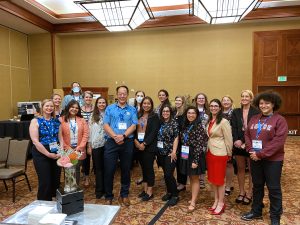Did You Miss Our Speaker Event with Lessa Kanani’opua Pelayo-Lozada?
Not to worry. ALASC’s Blogging and Events team has got you covered with all the wisdom Pelayo-Lozada had to offer on the evening of November 22, 2023.
Lessa Kanani’opua Pelayo-Lozada is the 2022-2023 President of the American Library Association. She works as the Adult Services Assistant Manager at the Palos Verdes Library District in Southern California. In 2022, she received the American Library Association Elizabeth Futas Catalyst for Change Award and was named a Library Journal Mover & Shaker in the advocacy category.
Relive the night on our YouTube Channel.
What Does “Inclusivity” Mean to You?
Pelayo-Lozada was invited to speak on the semester’s ALASC theme “inclusivity.” Alongside equity and diversity, inclusivity (together EDI) remains a core tenet of information work and community development. However, according to Kawanna Bright (2022), inclusivity is also the toughest to define for its close alignment to both equity and diversity.
 Our attendees took that challenge in stride before Pelayo-Lozada took the mic. In a Padlet poll, the night’s participants defined inclusivity for themselves, writing:
Our attendees took that challenge in stride before Pelayo-Lozada took the mic. In a Padlet poll, the night’s participants defined inclusivity for themselves, writing:
- Building towards a beautiful future
- Creating space for people of all identities
- Not privileging any particular group or voice
For Pelayo-Lozada, inclusivity work inherently intertwines with her mixed Native Hawaiian inheritance. Building on the strength and wisdom of her Hawaiian ancestors, namely her grandparents who built a strong community of diasporic Hawaiians in California, Pelayo-Lozada defines her leadership philosophy under the guiding concepts of kokua (service or support) and kuleana (responsibility).
Practicing LIS Skills With the Heart
Programming, displays, outreach, and collection development practices that invite people of marginalized backgrounds to see themselves as a member of our library communities are only part of LIS EDI duties. To go a step further would be to share power and extend your ear towards the service community. Conversations and listening sessions, among other open-hearted methods, uncover communities’ aspirations that a library can then fit into.
Pelayo-Lozada gives the example of a community aspiring to have a stoplight at a tricky intersection. While the library cannot directly ask for one, it can devise classes about civic participation and how to petition or write letters to representatives. It can host programs specifically for writing to representatives to generate collective action.
Besides an invitation towards others, inclusivity is also an invitation to the self. Introverts, as so many LIS students and practitioners are, need a little nudge. Sometimes even a shove. On her library leadership journey, Pelayo-Lozada admits, “I didn’t volunteer much until I was invited.” Looking beside you at your classmate and giving a compliment on their performance in a group project may energize them to self-nominate for leadership opportunities. Not to mention, critically analyzing your own weaknesses, your growth, as well as your strengths will give insight into your qualifications for specific job openings. In all, never discount anyone’s abilities, as we need volunteers in the coming fight for inclusivity.
Working Towards an Inclusive World
The world we live in is not equal. Race, ethnicity, gender, and all the other ways society has devised to identify and marginalize individuals affect our relationships to one another. The intersectionality of these identities also affects how similar people relate to each other.
Equality is not possible until we start with equity, and then inclusivity, as Pelayo-Lozada defines it, becomes “the intentional act of creating structures that requires us to look at and identify intersectionality.”
Inclusive practice is an intentional, ongoing fight that begins with an individual’s recognition of their own biases and culminates in a systemic and cultural shift in library and information services. In the last few years, the ALA’s Office for Intellectual Freedom has tracked 729 attempts to ban or restrict library materials in 2021 alone. Waves of political activism are targeting libraries to abolish free and equitable access to information and challenge Americans’ First Amendment rights. It is a fight on inclusivity.
Inclusive Practice You Can Engage in Now
First of all, recognize you are more powerful when you are allied with others. If you are able, join groups like the ALA or a national association of librarians of color and participate in their acts of service. Second, get involved in your workplace’s EDI efforts. Learn about other cultures in your community. Find ways to extend the invitation to your space.
Equality is the goal, inclusivity is the path, but in the words of Haunani Kay Task, “resistance is the reward.”
Thank you to Lessa Kanani’opua Pelayo-Lozada for joining us! View the recording of the event on our YouTube Channel.
References
Bright, K. (2022). Equity of access, diversity, and inclusion. In S. Hirsch (Ed.), Information Services Today (3rd ed, 67-79). Rowman & Littlefield.

